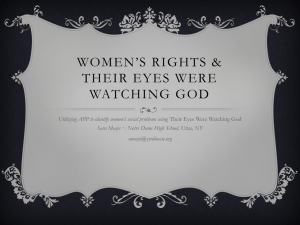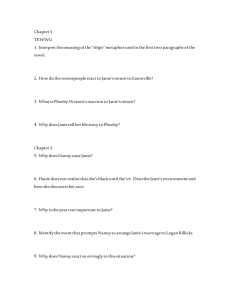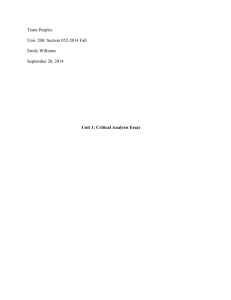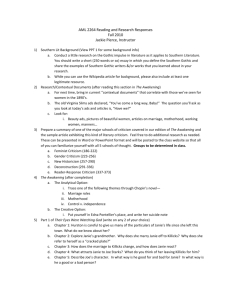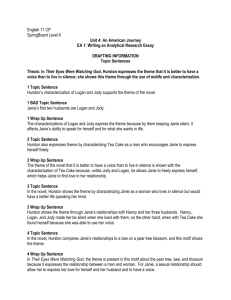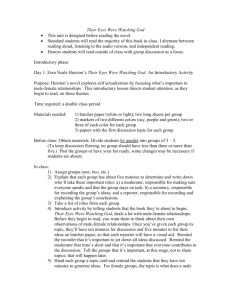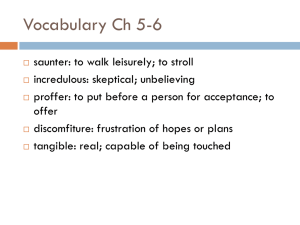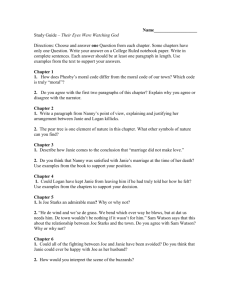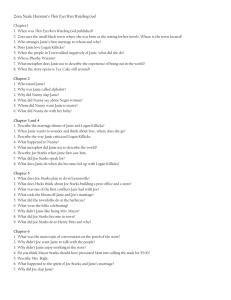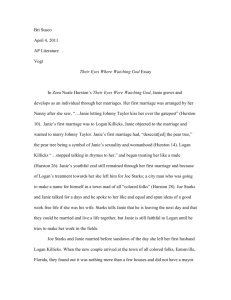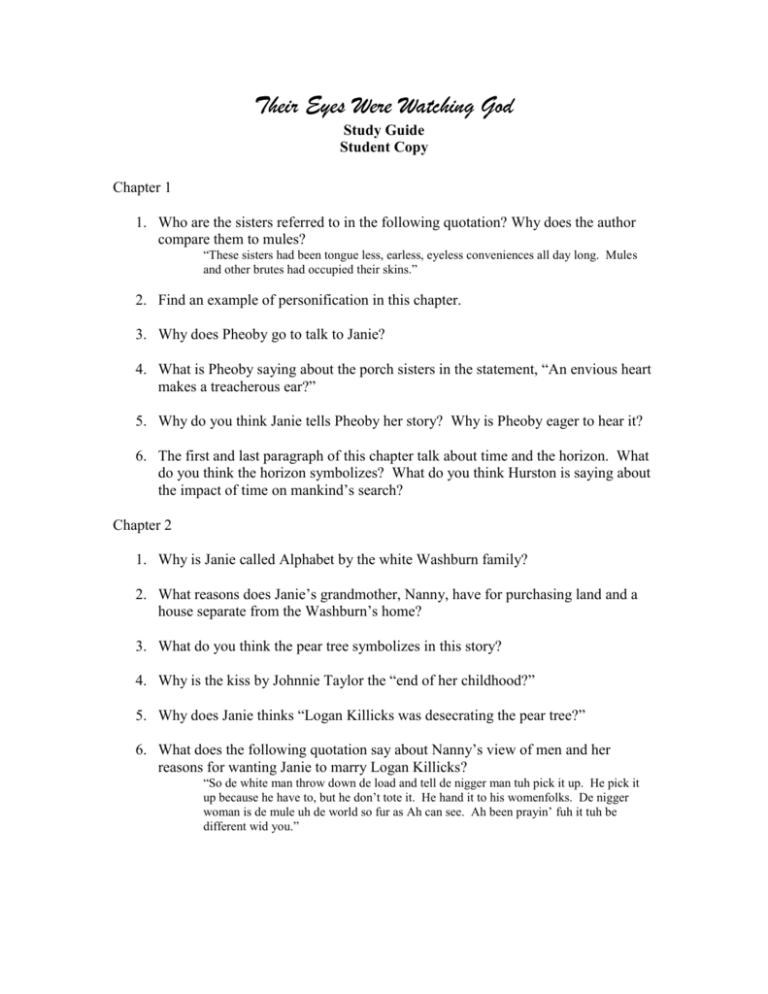
Their Eyes Were Watching God
Study Guide
Student Copy
Chapter 1
1. Who are the sisters referred to in the following quotation? Why does the author
compare them to mules?
“These sisters had been tongue less, earless, eyeless conveniences all day long. Mules
and other brutes had occupied their skins.”
2. Find an example of personification in this chapter.
3. Why does Pheoby go to talk to Janie?
4. What is Pheoby saying about the porch sisters in the statement, “An envious heart
makes a treacherous ear?”
5. Why do you think Janie tells Pheoby her story? Why is Pheoby eager to hear it?
6. The first and last paragraph of this chapter talk about time and the horizon. What
do you think the horizon symbolizes? What do you think Hurston is saying about
the impact of time on mankind’s search?
Chapter 2
1. Why is Janie called Alphabet by the white Washburn family?
2. What reasons does Janie’s grandmother, Nanny, have for purchasing land and a
house separate from the Washburn’s home?
3. What do you think the pear tree symbolizes in this story?
4. Why is the kiss by Johnnie Taylor the “end of her childhood?”
5. Why does Janie thinks “Logan Killicks was desecrating the pear tree?”
6. What does the following quotation say about Nanny’s view of men and her
reasons for wanting Janie to marry Logan Killicks?
“So de white man throw down de load and tell de nigger man tuh pick it up. He pick it
up because he have to, but he don’t tote it. He hand it to his womenfolks. De nigger
woman is de mule uh de world so fur as Ah can see. Ah been prayin’ fuh it tuh be
different wid you.”
7. What dreams is Nanny referring to in the following quotation? Are they Nanny’s
dreams or Janie’s?
“Ah was born back due in slavery so it wasn’t for me to fulfill my dreams of whut a
woman oughta be and do. Dat’s one of de hold-backs of slavery. But nothing can’t stop
you from wishin.”
8. What do we learn about Janie’s grandfather in the flashback to Nanny’s youth?
What do we learn about Janie’s father?
9. Why is this novel considered an example of a frame narrative?
Chapter 3
1. What indications are there that Janie marries Logan Killicks hoping to find love?
2. What does Janie dislike about her husband?
3. What do you think Nanny prays for the night before her death?
4. How does Mr. Killicks treat Janie?
Chapter 4
1. Why does Mr. Killicks go to Lake City?
2. Briefly describe Joe Starks. In what sense is he a caricature of a black man who
embraces the white man’s definition of a strong, powerful man?
3. What is Joe Starks’ dream? What does he see as Janie’s place in his “dream?”
4. How does Janie hurt Logan before she leaves? How does he try to hurt her back?
Chapter 5
1. What does Joe Starks do that surprises the townspeople? How do the men react to
Janie?
2. Why does Janie go home after the town meeting “feeling cold?”
3. How does Janie feel about being the mayor’s wife?
4. Support that the following statement is true for Joe Starks: “But any man who
walks in the way of power and property is bound to meet hate.”
5. What does the following quotation suggest is wrong with Janie’s and Joe’s
relationship?
“Ah often wonder how dat lit wife uh hisn makes out wid him, ‘cause he’s uh man dat
changes everything, but nothin’ don’t change him.”
Chapter 6
1. Why is the mule talk in front of the store both entertaining and frustrating for
Janie?
2. What prompts Joe to insist that Janie wear a rag over her hair?
3. How does Joe become a big man in Janie’s eyes?
4. How does Sam Watson explain the odd spectacle of the dead mule on his back
with his feet sticking up in the air?
5. Why is Janie excluded form the mule’s funeral?
6. Local color is defined as details and descriptions common to a certain place.
Some critics point out Hurston presents the local color of the black community
through the stories told on the front porch of the store. Find two examples of
local color in this chapter. Briefly state what is learned about the community from
the stories.
7. Folklore is the body of customs, superstitions, stories, dances and songs that have
been passed down through oral tradition. In what ways is the story about the mule
an example of the town’s folklore?
8. What event in Janie’s marriage convinces her that Joe isn’t the wonderful man she
thought she was marrying? How does she survive in the marriage without losing
her identity?
9. At the end of the chapter, Janie finally speaks her mind. According to Janie, what
is God’s opinion of women? How does she think he will judge the men’s
behavior toward women?
Chapter 7
1. Why does Joe start hassling Janie about her age?
2. What does Janie say to Joe in front of his friends that humiliates him? What does
he do to retaliate?
Chapter 8
1. Why does Joe have Mrs. Davis cook his meals instead of Janie?
2. Cite a quotation illustrating how Hurston uses personification to describe death.
3. What does Joe think must happen before he can be cured?
4. What does Janie tell her husband just before he dies?
5. How does Janie symbolically express her freedom from Joe after his death?
6. A static character is a character that does not change throughout the novel.
Support or refute the following statement: Joe Starks is a static, or flat, character?
Chapter 9
1. What does the following quotation illustrate Janie’s feelings towards Nanny?
“But Nanny belonged to that other kind that loved to deal in scraps. Here Nanny had
taken the biggest thing God ever made, the horizon-for no matter how far a person can go
the horizon is still way beyond you-and pinched it in to such a little bit of a thing that she
could tie it about her granddaughter’s neck tight enough to choke her.”
2. What does Janie feel at her husband’s funeral?
3. How does Hezekiah amuse Janie?
4. Besides removing the head rags, what changes does Janie make in her daily life?
Chapter 10
1. On the day of their first meeting, what two things does Tea Cake do with Janie to
help her to like him immediately?
2. Why does Janie trust Tea Cake enough to let him help her shut up the store and
walk her home?
Chapter 11
1. Why is Janie afraid to ask Hezekiah about Tea Cake?
2. What new experiences does Tea Cake give to Janie in this chapter?
3. Why does Janie take a “good look at her mouth, eyes, and hair” before going to
bed?
4. What do you think Tea Cake means when he says “Ah ruther be shot wid tack
than fuh you tuh act wid me lak you is right now.” You got me in de go-long?”
5. Why do you think Janie compares Tea Cake to the pear tree in the following
quotation?
“He could be a bee to a blossom-a pear tree blossom in the spring.”
Chapter 12
1. Why are the townspeople mad that Janie is seeing Tea Cake?
2. What does Janie mean when she says, “Ah done lived Grandma’s way, now Ah
mean tuh live mine”?
3. Why is Janie selling the store instead of living there with Tea Cake?
Chapter 13
1. Why doesn’t Janie tell Tea Cake about the two hundred dollars she has pinned
inside her shirt?
2. Who is Mrs. Tyler? Why is Janie worried about being like her?
3. What do you think of Tea Cake’s reasons for staying away all night without
contacting Janie? Do you think Janie’s reaction to his story is believable?
4. What “secret” profession does Tea Cake reveal to Janie in this chapter? What
purchases does he make for his profession?
5. Why does Tea Cake keep Janie’s two hundred dollars?
6. What is “the muck?”
Chapter 14
1. Why do Janie and Tea Cake look for a room with a bathtub?
2. What new skill does Tea Cake teach Janie while they are waiting for the picking
season to begin? Is she a good student?
3. How does Tea Cake get Janie to join the rest of the women in the fields? Why
does he encourage her to work?
4. Why is Janie sorry for her friends in Eatonville and scornful of the other people
she has left behind?
Chapter 15
1. Why do you think Hurston devotes an entire chapter to Janie’s jealousy of Tea
Cake and Nunkie?
Chapter 16
1. What is Mrs. Turner’s appalling attitude toward black men like Tea Cake?
2. Why does Tea Cake decide he doesn’t want to eat at Mrs. Turner’s restaurant any
more?
3. Why does Mrs. Turner persist in visiting Janie even though Janie tries to
discourage Mrs. Turner’s visits?
4. Find a comment in this chapter showing Tea Cake’s opinion of Mrs. Turner’s
bigoted attitudes.
5. In what ways may the character of Mrs. Turner be a caricature of the black person
corrupted by the standards of white culture?
Chapter 17
1. Why does Tea Cake beat Janie?
2. Support or refute the following statement: Tea Cake only pretends to help Mrs.
Turner and is really trying to start a fight.
3. Why doesn’t Mrs. Turner’s husband, son, or brother help her stop the fight?
Chapter 18
1. How are Janie and Tea Cake forewarned about the impending hurricane? Why do
they ignore the warning?
2. A legend is a story handed down through oral tradition about a possibly historical
person. Find an example of a legend in this chapter.
3. Briefly describe Motor Boat.
4. In what way does Janie believe in fate and accept her troubles as the will of God?
5. The title for this story is embedded in the following quotation. Why do you think
Hurston choose this title? What do you think she is saying about life in general?
“They sat in company with others in shanties, their eyes straining against crude walls
and their souls asking if He meant to measure their puny might against His. They
seemed to be staring at the dark, but their eyes were watching God.”
6. Why does Janie fall into the water?
7. How does Janie get out of the water? How is Tea Cake injured?
8. Hurston wrote this novel in only seven weeks. Knowing this, how believable is
the incident with the cow and the dog?
9. Find an example of personification in this chapter.
10. Briefly describe the dog that is riding on the cow’s back.
Chapter 19
1. How do the men determine which bodies are white and which bodies are black?
What do they do with the corpses once they decide their race?
2. The Jim Crow law is the name given to the laws in the Southern states used to
separate blacks and whites in restaurants, public rest rooms, transportation, etc.
What do you think Tea Cake is saying about God in the following quotation?
“They’s mighty particular how dese dead folks goes tuh judgment,” Tea Cake observed to the
man working next to him. “Look lak dey think God don’t known nothin’ about de Jim Crow
law.”
3. Why does Tea Cake decide to “go where de white folks know me?”
4. What happens to Motor Boat in the storm?
5. What indications are there in the story that both Tea Cake and Janie know Tea
Cake has rabies even before they send for the doctor?
6. Find a quotation in this chapter showing that Janie prays for God’s help but also
accepts that the decision over Tea Cake’s fate may already have been made.
7. Why doesn’t Janie remove the bullets from Tea Cake’s gun? If she loves him so
much, why does she shoot him with the rifle?
8. How are the circumstances of Tea Cake’s death an example of irony? How can
Tea Cake’s death be considered a “blessing” for him?
9. Do you think it is believable that the white doctor, the sheriff, and the judge all
work together to give Janie a quick and merciful trial?
10. Why do you think Janie would have preferred having white women on the jury
instead of white men?
11. How do the black people at the trial demonstrate their bigotry toward women?
12. Why is it significant that Janie attends Tea Cake’s funeral in her overalls instead
of the expensive clothes she wears to Joe Starks’s funeral?
Chapter 20
1. What is Janie telling Pheoby about love in the following quotation?
“Love is lak de sea. It’s uh movin’ thing, but still and all, it takes its shape from de shore it
meets, and it’s different with every shore.”
2. Find a quotation stating the two things Janie says all people must do for
themselves?
3. What does Pheoby do to change her own life after listening to Janie’s adventure
with Tea Cake?
4. In the following, what do you think the horizon symbolizes? What does the
following quotation suggest about how Janie plans to live the rest of her life?
“She pulled in her horizon like a great fish-net. Pulled if from around the waist of the world and
draped if over her shoulder. So much of life in its meshes! She called in her soul to come and
see.”

